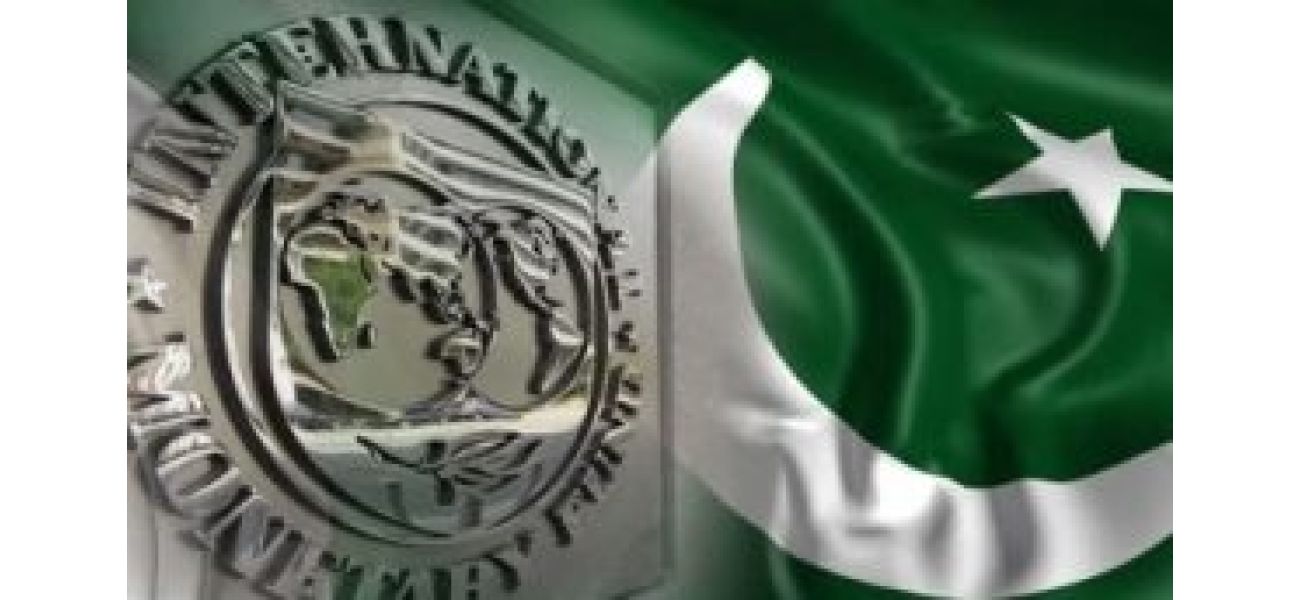IMF approves $7 billion rescue package for Pakistan.
IMF approves $7 billion bailout for Pakistan, with first loan tranche of less than $1.1 billion to address economic crisis.
September 26th 2024.

In a recent announcement, the International Monetary Fund (IMF) has approved a new bailout package of USD 7 billion for Pakistan. This comes as a much-needed relief for the cash-strapped country as it continues to struggle with its ongoing economic crisis. The first loan tranche of less than USD 1.1 billion has been authorized for immediate release, in order to support Pakistan's efforts in addressing the economic challenges it currently faces.
The approval for this 37-month Extended Fund Facility (EFF) was given by the IMF Executive Board, after a meeting held in Washington on Wednesday. This decision was made after Pakistan promised to make significant changes, including overhauling its agriculture income tax, transferring some fiscal responsibilities to provinces, and limiting subsidies.
The Prime Minister's Office has confirmed that the Executive Board has approved the loan, which will be the 25th IMF programme that Pakistan has obtained since 1958. This is also the sixth EFF that the country has received. According to the Ministry of Finance, Pakistan will have to pay an interest rate of around 5%, as stated in a report given to the Senate Standing Committee on Economic Affairs by The Express Tribune.
Prime Minister Shehbaz Sharif has expressed that this will be the last IMF programme for Pakistan. This statement holds true, as he had made the same promise after the approval of the 24th programme back in 2023. He also gave credit to Deputy Prime Minister Ishaq Dar, Chief of the Army Staff General Asim Munir, and the finance team for securing this new bailout package. However, he also acknowledged that the cooperation of all four provinces is crucial in successfully completing this programme.
The provincial governments have also played their part in this process. The Sindh government ratified a memorandum of understanding on July 30, while the Balochistan government signed it on July 26, following the staff-level agreement between Pakistan and the IMF on July 12. Despite some concerns about not addressing the root causes of economic troubles, the IMF board approved the programme. These root causes include the need to restructure external and domestic debt, which consumed 81% of Pakistan's tax revenues in the last fiscal year.
The new bailout package aims to achieve macroeconomic stability by consolidating public finances, rebuilding foreign exchange reserves, reducing fiscal risks from state-owned enterprises, and improving the business environment to encourage growth led by the private sector. In order to qualify for the programme, the Pakistani government has already taken several steps, such as raising Rs 1.8 trillion in additional taxes, increasing electricity prices by up to 51%, and promising transparency in the affairs of the Sovereign Wealth Fund.
The government has also taken a loan of USD 600 million, which is the most expensive one in Pakistan's history, to secure a date for the IMF board meeting. The power sector fiscal viability, privatization of loss-making entities, and enhancing tax revenues are some of the core conditions of this programme. Unlike in the past, when provincial budgets were not included in the IMF's purview, the new programme also covers provincial budgets and their revenues. This means that nearly a dozen conditions will directly impact the provinces.
According to the conditions agreed upon with the IMF, the federal and provincial governments will sign a new National Fiscal Pact by next Tuesday. This will transfer the responsibilities of health, education, social safety net, and road infrastructure projects to the provinces. All four provincial governments will also align their agriculture income tax rates with the federal personal and corporate income tax rates by amending their laws by October 30. This will result in an increase in the agricultural income tax rate from 12-15% to 45% in January next year.
Moreover, the provincial governments will have to refrain from giving further subsidies on electricity and gas, and not establish any new Special Economic Zones or Export Processing Zones, as per the IMF agreement. The federal government will also not be allowed to have any new economic zones and will have to end the tax incentives of existing zones by 2035. Another condition requires Pakistan to show a primary budget surplus of 4.2% of the Gross Domestic Product (GDP) during the three-year programme period. This means that the country will have to significantly reduce non-interest expenses and impose an additional tax burden of 3% on existing taxpayers.
In case of a tax shortfall, the government has committed to bringing a mini-budget to increase tax rates on imports, contractors, professional service providers, and fertilizers. The Federal Board of Revenue (FBR) is facing the risk of a tax shortfall of over Rs 200 billion in the first quarter. As part of the IMF programme, the spending on defence and subsidies will have to remain at the same level as the previous fiscal year, in terms of the size of the economy.
However, it is important to note that the design of the programme has not fully addressed the issue of debt unsustainability. It is primarily built around the strategy of rolling over the maturing external debt during the programme period. Pakistan has also committed to not repay a debt of USD 12.7 billion to Saudi Arabia, China, the UAE, and Kuwait during this time. In order to qualify for the board approval, Pakistan had to bridge a USD 2 billion financing gap. To meet this gap, the country had to take the most expensive commercial loan in its history, at an 11% interest rate from Standard Chartered Bank.
In conclusion, while the new bailout package from the IMF is a much-needed relief for Pakistan, it also comes with several conditions and challenges. The rising political and institutional tensions may make it difficult to implement the reforms that the country has committed to deliver to the IMF, as warned by the Asian Development Bank. However, these reforms are crucial for ensuring that external lenders continue to lend to Pakistan. Only time will tell if the country is able to successfully complete this programme and achieve the desired stability in its economy.
The approval for this 37-month Extended Fund Facility (EFF) was given by the IMF Executive Board, after a meeting held in Washington on Wednesday. This decision was made after Pakistan promised to make significant changes, including overhauling its agriculture income tax, transferring some fiscal responsibilities to provinces, and limiting subsidies.
The Prime Minister's Office has confirmed that the Executive Board has approved the loan, which will be the 25th IMF programme that Pakistan has obtained since 1958. This is also the sixth EFF that the country has received. According to the Ministry of Finance, Pakistan will have to pay an interest rate of around 5%, as stated in a report given to the Senate Standing Committee on Economic Affairs by The Express Tribune.
Prime Minister Shehbaz Sharif has expressed that this will be the last IMF programme for Pakistan. This statement holds true, as he had made the same promise after the approval of the 24th programme back in 2023. He also gave credit to Deputy Prime Minister Ishaq Dar, Chief of the Army Staff General Asim Munir, and the finance team for securing this new bailout package. However, he also acknowledged that the cooperation of all four provinces is crucial in successfully completing this programme.
The provincial governments have also played their part in this process. The Sindh government ratified a memorandum of understanding on July 30, while the Balochistan government signed it on July 26, following the staff-level agreement between Pakistan and the IMF on July 12. Despite some concerns about not addressing the root causes of economic troubles, the IMF board approved the programme. These root causes include the need to restructure external and domestic debt, which consumed 81% of Pakistan's tax revenues in the last fiscal year.
The new bailout package aims to achieve macroeconomic stability by consolidating public finances, rebuilding foreign exchange reserves, reducing fiscal risks from state-owned enterprises, and improving the business environment to encourage growth led by the private sector. In order to qualify for the programme, the Pakistani government has already taken several steps, such as raising Rs 1.8 trillion in additional taxes, increasing electricity prices by up to 51%, and promising transparency in the affairs of the Sovereign Wealth Fund.
The government has also taken a loan of USD 600 million, which is the most expensive one in Pakistan's history, to secure a date for the IMF board meeting. The power sector fiscal viability, privatization of loss-making entities, and enhancing tax revenues are some of the core conditions of this programme. Unlike in the past, when provincial budgets were not included in the IMF's purview, the new programme also covers provincial budgets and their revenues. This means that nearly a dozen conditions will directly impact the provinces.
According to the conditions agreed upon with the IMF, the federal and provincial governments will sign a new National Fiscal Pact by next Tuesday. This will transfer the responsibilities of health, education, social safety net, and road infrastructure projects to the provinces. All four provincial governments will also align their agriculture income tax rates with the federal personal and corporate income tax rates by amending their laws by October 30. This will result in an increase in the agricultural income tax rate from 12-15% to 45% in January next year.
Moreover, the provincial governments will have to refrain from giving further subsidies on electricity and gas, and not establish any new Special Economic Zones or Export Processing Zones, as per the IMF agreement. The federal government will also not be allowed to have any new economic zones and will have to end the tax incentives of existing zones by 2035. Another condition requires Pakistan to show a primary budget surplus of 4.2% of the Gross Domestic Product (GDP) during the three-year programme period. This means that the country will have to significantly reduce non-interest expenses and impose an additional tax burden of 3% on existing taxpayers.
In case of a tax shortfall, the government has committed to bringing a mini-budget to increase tax rates on imports, contractors, professional service providers, and fertilizers. The Federal Board of Revenue (FBR) is facing the risk of a tax shortfall of over Rs 200 billion in the first quarter. As part of the IMF programme, the spending on defence and subsidies will have to remain at the same level as the previous fiscal year, in terms of the size of the economy.
However, it is important to note that the design of the programme has not fully addressed the issue of debt unsustainability. It is primarily built around the strategy of rolling over the maturing external debt during the programme period. Pakistan has also committed to not repay a debt of USD 12.7 billion to Saudi Arabia, China, the UAE, and Kuwait during this time. In order to qualify for the board approval, Pakistan had to bridge a USD 2 billion financing gap. To meet this gap, the country had to take the most expensive commercial loan in its history, at an 11% interest rate from Standard Chartered Bank.
In conclusion, while the new bailout package from the IMF is a much-needed relief for Pakistan, it also comes with several conditions and challenges. The rising political and institutional tensions may make it difficult to implement the reforms that the country has committed to deliver to the IMF, as warned by the Asian Development Bank. However, these reforms are crucial for ensuring that external lenders continue to lend to Pakistan. Only time will tell if the country is able to successfully complete this programme and achieve the desired stability in its economy.
[This article has been trending online recently and has been generated with AI. Your feed is customized.]
[Generative AI is experimental.]
0
0
Submit Comment





